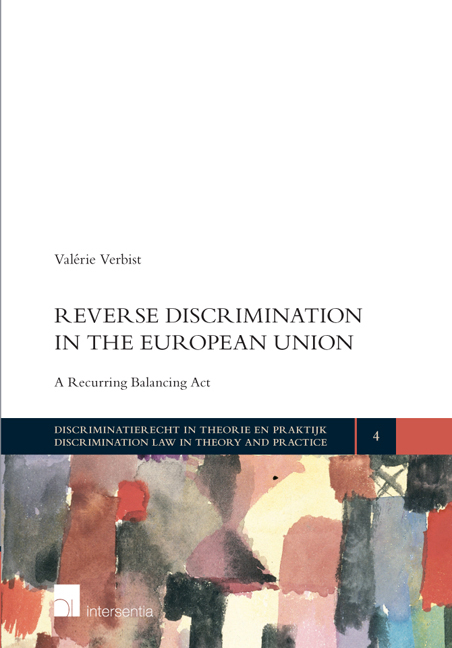Book contents
- Frontmatter
- Acknowledgements
- Contents
- Table of Cases of the European Court of Justice
- Chapter 1 Introduction
- Part I Reverse Discrimination from a Union Perspective
- Part II Reverse Discrimination from National Perspectives
- Part III Reverse Discrimination in a Federal State Context
- Chapter 6 Union Perspective on Reverse Discrimination in a Federal State Context
- Chapter 7 National Perspectives on Reverse Discrimination in a Federal State Context
- Conclusion Part III
- Chapter 8 Conclusion
- Bibliography
Chapter 6 - Union Perspective on Reverse Discrimination in a Federal State Context
from Part III - Reverse Discrimination in a Federal State Context
Published online by Cambridge University Press: 29 September 2018
- Frontmatter
- Acknowledgements
- Contents
- Table of Cases of the European Court of Justice
- Chapter 1 Introduction
- Part I Reverse Discrimination from a Union Perspective
- Part II Reverse Discrimination from National Perspectives
- Part III Reverse Discrimination in a Federal State Context
- Chapter 6 Union Perspective on Reverse Discrimination in a Federal State Context
- Chapter 7 National Perspectives on Reverse Discrimination in a Federal State Context
- Conclusion Part III
- Chapter 8 Conclusion
- Bibliography
Summary
THE STATUS OF REGIONS FROM A UNION PERSPECTIVE
This chapter will first describe the attitude of the EU vis- à -vis regions in general. This will be done by drawing both upon the Treaties and the Court's case law on these matters.
It should be pointed out that different denominations are used regarding the terminology in the context of federally structured Member States. The Treaties refer to ‘regions’ and ‘regional and local authorities’. The ECJ also uses the term ‘infra-State bodies’, in particular in the context of cases on State aid. Finally, Advocates General have used the terms ‘decentralised authority’ and ‘devolved administrations’. In general, this book uses the denominations employed in the Treaties, but when discussing ECJ cases or the opinion of an Advocate General, the denominations put forward by them will be used.
THE ECJ'S CASE LAW ON THE INTERNAL DIVISION OF COMPETENCES WITHIN A MEMBER STATE
The Autonomy of the Member States in the Allocation of Internal Powers
It is the ECJ's well-established case law that a Member State may freely allocate internal legislative powers as it sees fit and implement Union law by measures from regional or local authorities. In other words, the question as to which entity of a Member State ought to implement or transpose Union law is not a matter of Union law, but one which is governed by the national rules concerning the internal division of competences within that Member State. However, the Union measures at issue have to be implemented correctly.
The ECJ Does Not Accept Hiding behind Domestic Rules on State Structure
Although each Member State is free to organise its internal structure, the fact remains that it alone is responsible towards the Union, under Article 258 TFEU, for compliance with its obligations under Union law. If EU law is not implemented correctly by the regional or local authority, then the Member State is held liable and the latter may not take shelter behind the national constitutional rules on the internal division of competences in order to avoid the ECJ finding that the Member State has failed to fulfil its obligations under Union law.
- Type
- Chapter
- Information
- Reverse Discrimination in the European UnionA Recurring Balancing Act, pp. 267 - 302Publisher: IntersentiaPrint publication year: 2017



